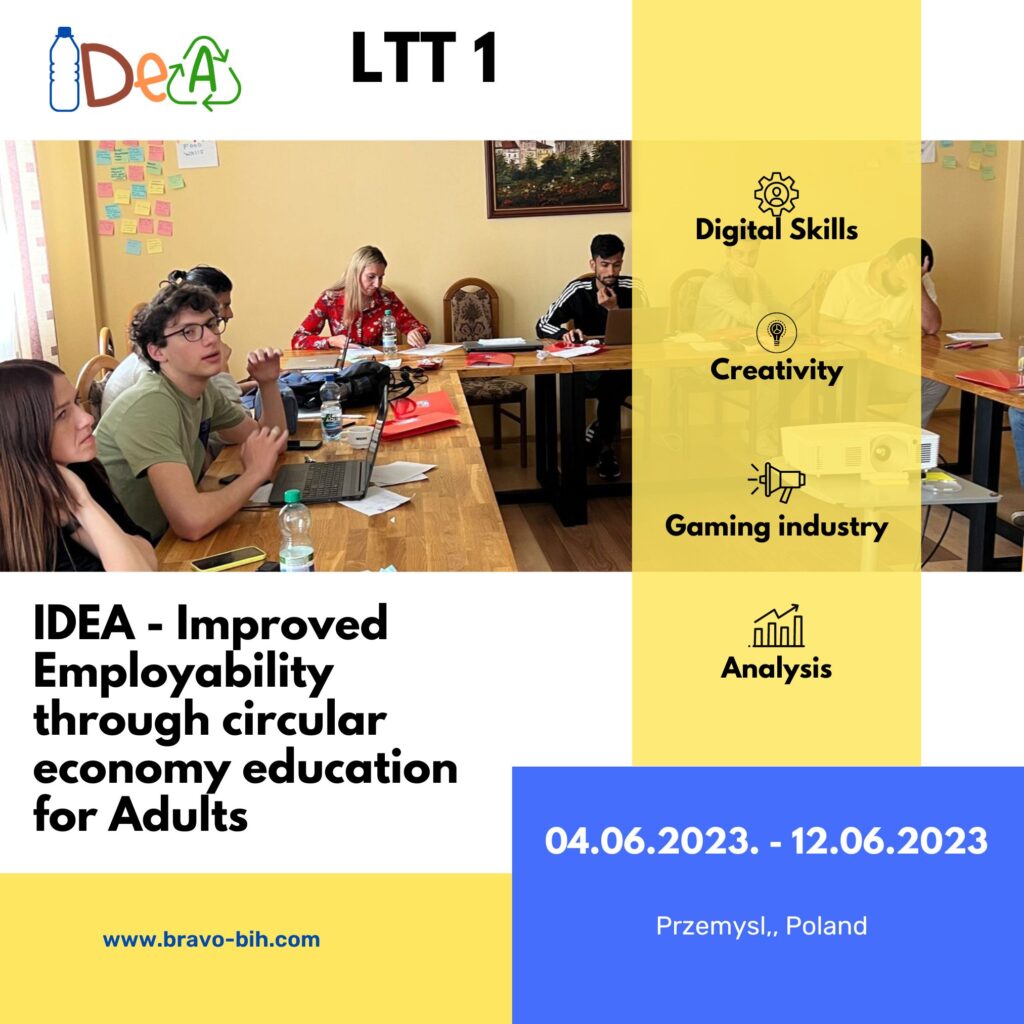
This time an LTT was held in Poland for the IDEA project from the 5th of June to the 12th of June. The participants started their first day with an introduction and representing themselves to others. They discussed how the training will go on for the next few days and about other technical concerns. They started with the theoretical part and then had time for practical work and implementing what they learned from the trainers there. They also discussed more about businesses and their effect on the economy, and how to improve their income but also by following rules of circular economy and environment protection. Then they had a task to build a plan about making changes in their countries by following the rules of the circular economy. They spoke more about plastic craftwork and watched videos of how plastic is ruining our entire planet. That was the most emotional part of the training, realizing that we are the only ones guilty of ruining our future. They had practical work on the topic of plastic craftwork and implementation of their ideas that were the result of group works. On the last day, they discussed everything said and learned during these few days,
and then filled out the evaluation forms and received their certificate.
The “Improved Employability through circular economy education for Adults” (IDEA) is a two-year Cooperation Partnership, a daring initiative to tackle the pressing issue of unemployment among adults while also fostering sustainable living practices through the promotion of the Circular Economy. The project, aligned with the principles of the European Green Deal and the EU Gender Equality Strategy 2020-2025, aims to create a profound intersection between these two pivotal strategies for societal advancement.
Over the course of 24 months, the IDEA Consortium will implement a series of critical actions. These will include three transnational project meetings which will bring together key stakeholders to shape the strategic direction of the project, discuss progress and challenges, and agree on next steps. It is through such collaborative efforts that IDEA aims to harmonise the European vision of sustainable growth and gender equality.
Central to IDEA’s mission is the Joint Staff Training Event (JSTE), which will deliver comprehensive learning and exchange opportunities to participants. The goal is not only to equip them with tools and methodologies that will promote the circular economy and sustainability but also to foster creativity through art, craft, and non-formal education (NFE) methodologies. The intention is to leverage diverse teaching approaches to engage participants and create a more enriching and impactful learning experience.
Moreover, the JSTE will serve as a testing ground for the Training Format produced in R1, laying the foundation for the activities to be incorporated into R2. This iterative process of testing and refining the training materials is designed to ensure their effectiveness and appropriateness for the targeted beneficiaries.
The first iteration of this training, LTT1, has been successfully conducted in Poland. In this, the participants from the initial JSTE, now trainers themselves, facilitated local workshops involving unemployed adults. This practical phase was designed to test the activities planned for inclusion in R2, allowing for real-world, practical feedback from the target demographic to be incorporated into the project’s development.
In addition to the traditional workshop format, IDEA is leveraging the power of digital technology. The insights and experiences derived from these local workshops will help shape the development of video tutorials to be included in R3. These digital resources will ensure the project’s learnings are accessible to a wider audience, empowering even more individuals with the knowledge and skills to thrive in a circular economy.
IDEA’s implementation of LTT1 in Poland exemplifies how strategic educational initiatives can promote the principles of circular economy and sustainability among unemployed adults. As the project advances, we can anticipate a ripple effect, where the seeds of sustainable thinking and practices planted by IDEA will proliferate across European societies.
Through education and empowerment, IDEA seeks to nurture a generation of adults who are not only employable but are also well-equipped to thrive in a circular, sustainable economy. This is more than a project; it’s a vital mission that aims to change lives while safeguarding our planet.
